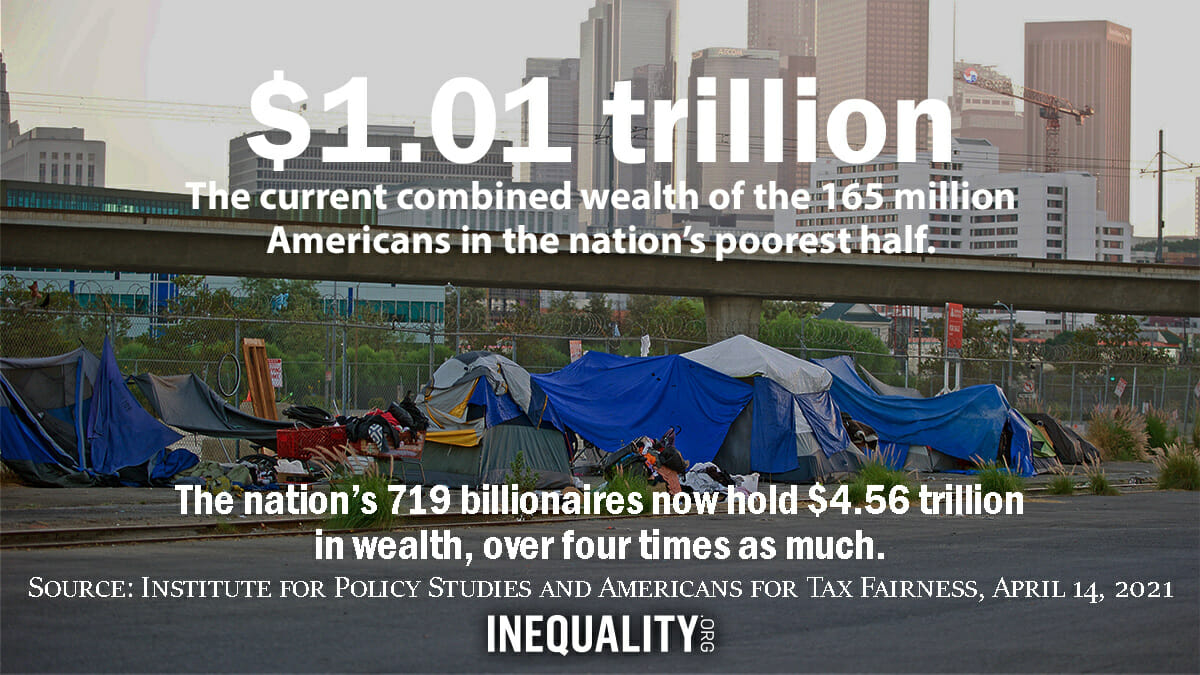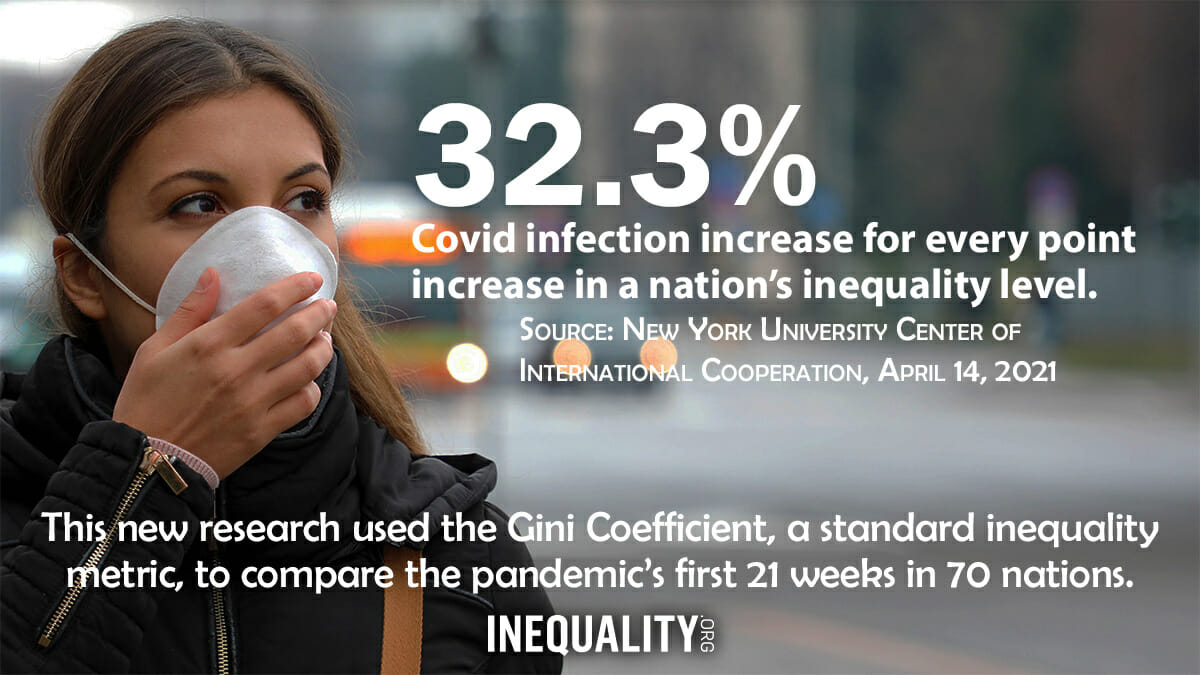| THIS WEEK |
Since the onset of Covid-19, our Inequality.org team has been diligently documenting just how much our billionaire class has added to its collective fortune. But this enormous billionaire greed grab — $1.6 trillion over the last 13 months — reflects just one product of an economic system that enables inequality to not only exist, but to thrive.
Another equally abominable product: our growing CEO-worker pay gap.
Earlier this month, our Inequality.org co-editor and fair pay expert Sarah Anderson joined veteran egalitarian analyst Jim Lardner on his Feet to the Fire podcast to discuss how this gap deepens income and racial inequality and what we can do to address it. Give a listen and stay tuned for Sarah’s upcoming annual report on executive excess later this spring.
Now more than ever, we need to shine a bright spotlight on how the pandemic is crushing working families while corporate boards continue to so zealously pump up CEO pay.
Chuck Collins and Rebekah Entralgo,
for the Institute for Policy Studies Inequality.org team |
|
| |
|
| INEQUALITY BY THE NUMBERS |
 |
|
|
|
| |
|
| FACES ON THE FRONTLINES |
 |
| Everyone Benefits from a Strong Care Economy |
| In 1938, domestic workers were deliberately excluded from the Fair Labor Standards Act. As a result, this vital workforce has been routinely denied a living wage, the right to organize a union, and protections against harassment or unsafe working conditions. The Covid-19 pandemic has only exacerbated the vulnerability of this essential workforce. Socorro Diaz, a member of the Women’s Action and Solidarity Alliance of the Graton Day Labor Center in California, urges everyone to call on lawmakers to support federal protections for domestic workers, like those included in President Biden’s new jobs and infrastructure plan. |
|
| |
|
| WORDS OF WISDOM |
 |
|
|
|
| |
|
PETULANT PLUTOCRAT
OF THE WEEK |
 |
| A CEO’s ‘Freedom’ Road to a Mega-Billion Fortune |
| Brian Armstrong, the CEO of the roaring-hot Coinbase cryptocurrency exchange, likes to describe his company’s mission as working “to bring economic freedom to people all over the world.” What does Armstrong mean by “economic freedom”? Certainly not the right to push your employer to help build a more equal world. Last September the Coinbase chief labeled employee moves to involve his company in the George Floyd protests a “distraction” that could create “internal division” and “destroy a lot of value.” Coinbase engineers had earlier organized a work stoppage after Armstrong had “declined to answer” a Black Lives Matter question during one of the firm’s internal Ask-Me-Anything sessions. Armstrong spent last week, by contrast, jubilantly answering every question he could about Coinbase’s rousing debut on Wall Street. The initial public trading of Coinbase shares Wednesday sent the value of Armstrong’s stake in the company soaring to an estimated $16 billion. |
|
| |
|
| BOLD SOLUTIONS |
 |
| State and Local Taxes to Narrow Racial Gaps |
| An overwhelming majority of U.S. states and cities rely on sales and other regressive taxes that widen racial income inequalities. In Tennessee, for example, such taxes account for about 5 percent of earnings for the average Black or Latino family and just 3.9 percent of white family earnings. The Institute on Taxation and Economic Policy has developed a menu of alternative options for equitable and sustainable tax systems at all levels of government. In a new Inequality.org commentary, ITEP experts share some positive examples of states already using higher taxes on large corporations and the wealthy to advance racial equity. |
|
| |
|
| GREED AT A GLANCE |
 |
|
|
|
| |
|
| TOO MUCH |
 |
| What Can We Do to Start Civilizing Our Richest? |
| Our U.S. billionaires, just over three months into the new year, now count 719 three-comma souls in their ranks. They hold an astounding $4.56 trillion in wealth. The worldwide billionaire population, meanwhile, has leaped by 660 over the past year, to over 2,750. The world’s 20 richest individuals now hold more wealth than the entire bottom half of humanity. Can the world’s wealth continue to concentrate this intensely forever? The simple answer: Nothing in human affairs goes on forever. But can we point to any hopeful indications that a turnaround — some real limits on grand fortune — may actually be approaching? We certainly can, if we look closely enough. Inequality.org co-editor Sam Pizzigati, author of The Maximum Wage, has more. |
|
|
|
| |
|
| MUST READS |
This week on Inequality.org
Chuck Collins, A Third of U.S. Billionaire Wealth Gains Since 1990 Have Come During Pandemic. U.S. billionaire fortunes have now increased 55 percent since the pandemic hit.
Elsewhere on the Web
Emmanuel Saez and Gabriel Zucman, Don’t wait for billionaires to sell their stock. Tax their riches now, Washington Post. A proposal for taxing the unrealized capital gains of America’s richest.
Katherine Wiles, A big number that poses big ethical questions, MarketPlace. Why we should have no billionaires.
Danny Dorling and Annika Koljonen, Finntopia, New Internationalist. For the third year in a row, Finland has topped the UN's world happiness rankings. The scoop on the pivotal role Finland’s economic equality plays.
Hillary Hoffower, There’s a wealth gap even between millionaires, and it says a lot about growing inequality, Business Insider. New stats show just how concentrated wealth really remains at the top.
Brett Arends, CEO pay has gone up 10-fold in the past 40 years — do they deserve it? MarketWatch. A look at the newest research that says absolutely not.
Theodore Schleifer, Tech billionaires are staying “very, very quiet” on proposals to tax their wealth, Vox. Deep pockets like Bill Gates posture as woke deep pockets open to paying higher taxes. In practice, they’re taking a pass at legislative crunch time.
Sharon Zhang, Billionaires’ Pandemic Profits Alone Could Pay for Most of Infrastructure Plan, Truthout. And some of the U.S. CEOs who have profited the most from the pandemic treat their workers the worst.
Lawrence Mishel, The enormous impact of eroded collective bargaining on wages, Economic Policy Institute. How declining unionization has, among other impacts, widened inequality between high-wage and middle-wage earners.
Eric Kades, A New Feudalism: Selfish Genes, Great Wealth, and the Rise of the Dynastic Family Trust, SSRN. Interviews with estate lawyers serving ultra-rich clients reveal that some of our wealthiest are already exploiting new tax loopholes to financially empower their bloodlines essentially forever. |
|
| |
|
| A FINAL FIGURE |
 |
|
|
|
| |
|
| BE THE 1% (NO, NOT THAT 1%) |
 |
Our goal for 2021: that 1% of our Inequality.org subscribers become monthly sustainers and help grow our newsletter and research efforts. Be the 1%, for as little as $3 a month! |
|
|
|
| |
|
|